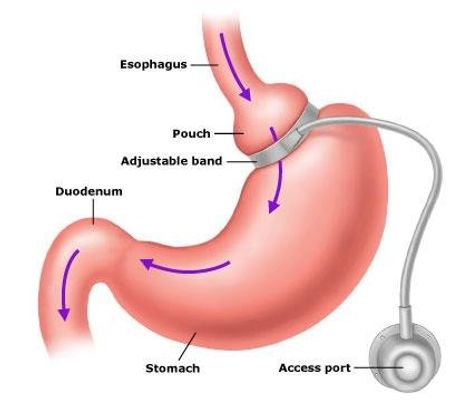Laparoscopic Adjustable Gastric Band

The band is a simple premise. Laparoscopically, an adjustable, soft, inflatable band is placed around the upper part of the stomach to create a smaller stomach pouch. This works by restricting you portion size and hormone changes reduce your hunger and increase your satiety. There is not cutting or joining of the stomach or the bowels so the risks are lower and there is no malabsorption as everything is in continuity. LAGB was incredibly popular when introduced in the 1990s. Bands were marketed as being very safe to place, effective, adjustable and easily removable without the issues of nutritional deficiencies that are more common with the other weight loss surgeries. But this has not totally been borne out. Over time, there have been numerous issues. The weight loss is not as dramatic or sustained as other surgeries, and tight bands led to dilatation of the gastric pouch and oesophagus over time and can even erode into the stomach or slip leading to major problems and more surgery to deal with these problems. Adhesions and scar tissue forms under the band so they certainly leave their mark. They have fallen out of favour in most of the world but remain strangely popular in the UK. I don’t like them but they possibly have a place in a defined group of patients – mostly young women, with lower BMIs (around 30kg/m2), who want something that is adjustable and are happy to have repeated adjustments to stay in the correct weight loss zone. Regardless, I am happy to work with your band if you have one; remove your band or deal with the other consequences and problems they can cause; or revise your band to another more effective weight loss operation.
Advantages
· Small meals & less hunger
· Feel fuller quicker and stay fuller for longer
· Lose 15-20% of total body weight
· Adjustable – can release restriction if wanting to attend a social function for example
· Reversible
· Technically the easiest of operations – a daycase procedure to place.
· Bowel and stomach remain intact and without joins
· No malabsorption
Disadvantages
· Weight loss slow and less dramatic than other procedures (in 10% is very poor)
· Need adjustments to the band on a regular basis to be effective
· Infection due to accessing the port for the band with a needle
· Leakage is possible leading to failure of the system
· Port can become visible with weight loss
· Band slip can lead to failure or gastric damage
· Band erosion into the stomach
· Dilatation of the pouch above the band or the oesophagus
· Reflux is common in around 10% of patients
· 1 in 5 bands need to be removed and 1 in 7 need a second operation to keep the band working
finesurgery | YOUR Clinic in Jersey
Suite 3.2, lido medical centre, st saviour, Jersey, je2 7la